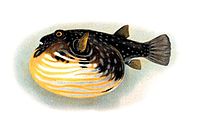
Photo from wikipedia
Objectives Pesticide exposure may impair human olfaction, but empirical evidence is limited. We examined associations between occupational use of 50 specific pesticides and olfactory impairment, both self-reported, among 20 409 participants… Click to show full abstract
Objectives Pesticide exposure may impair human olfaction, but empirical evidence is limited. We examined associations between occupational use of 50 specific pesticides and olfactory impairment, both self-reported, among 20 409 participants in the Agricultural Health Study, a prospective cohort of pesticide applicators (mostly farmers, 97% male). Methods We used logistic regression models to estimate odds ratios (OR) and 95% confidence intervals (CI) for associations between pesticide use at enrolment (1993–1997) and olfactory impairment reported two decades later (2013–2016), adjusting for baseline covariates. Results About 10% of participants reported olfactory impairment. The overall cumulative days of any pesticide use at enrolment were associated with a higher odds of reporting olfactory impairment (OR (highest vs lowest quartile): 1.17 (95% CI: 1.02 to 1.34), p-trend = 0.003). In the analyses of 50 specific pesticides, ever-use of 20 pesticides showed modest associations with olfactory impairment, with ORs ranging from 1.11 to 1.33. Of these, higher lifetime days of use of 12 pesticides were associated with higher odds of olfactory impairment compared with never use (p-trend ≤ 0.05), including two organochlorine insecticides (dichlorodiphenyltrichloroethane and lindane), two organophosphate insecticides (diazinon and malathion), permethrin, the fungicide captan and six herbicides (glyphosate, petroleum distillates, 2,4-dichlorophenoxyacetic acid, 2,4,5-trichlorophenoxyacetic acid and metribuzin), although many of these did not exhibit clear, monotonic exposure-response patterns. Conclusion Overall, we found relatively broad associations between pesticides and olfactory impairment, involving many individual pesticides and covering several chemical classes, suggesting that pesticides could affect olfaction through multiple pathways. Future epidemiological studies with objective measurement of olfaction are required to confirm these findings.
Journal Title: Occupational and Environmental Medicine
Year Published: 2020
Link to full text (if available)
Share on Social Media: Sign Up to like & get
recommendations!